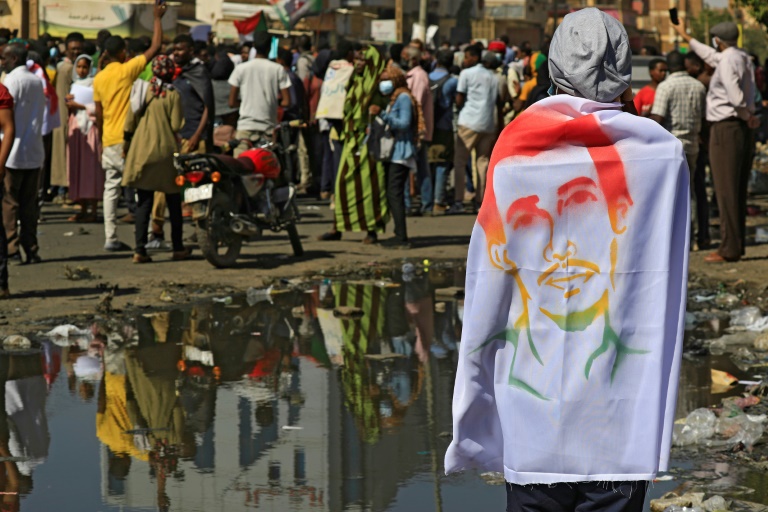
KHARTOUM - Sudanese gathered to demand justice Monday for the scores killed in a months-long crackdown since a military coup -- then three more were shot dead, according to medics.
The latest killings by security forces came during demonstrations in the capital Khartoum, and in a city to the south, by thousands calling for civilian rule, they said.
An October 25 coup led by General Abdel Fattah al-Burhan derailed a power-sharing transition between the military and civilians that had been painstakingly negotiated after the 2019 ouster of longtime autocrat Omar al-Bashir.
According to the Central Committee of Sudan Doctors, the first protester was shot in the chest with a live round. The second took a bullet to the head.
The third was killed in the city of Wad Madani, south of Khartoum, with bullets to the head and the shoulder, the Committee said.
The latest deaths bring to 76 the number of people killed in the crackdown on anti-coup demonstrations, the medics said, despite condemnation by United States officials last week "of disproportionate force against protesters".
As they do routinely, security forces also fired tear gas on Monday at the protesting crowds.
Many people were seen suffering breathing difficulties while others were bleeding after being hit by tear gas canisters, an AFP correspondent said.
The pro-democracy Doctors' Committee said security forces used "excessive violence" to quell the protests in Khartoum and its twin city of Omdurman.
In a musical procession through the capital, men and woman carried Sudanese flags and hand-written signs as they clapped, blew whistles and banged drums. Black smoke rose from tyres burning at a protest barricade.
Demonstrations were also held in the Red Sea city of Port Sudan, as well as the eastern state of Gedaref, according to witnesses.
"No, no to military rule," and "civilian (rule) is the people's choice" protesters shouted in Wad Madani, according to witness Emad Mohamed.
Sudan's authorities have repeatedly denied using live ammunition against demonstrators, and insist scores of security personnel have been wounded during protests.
A police general was stabbed to death during the unrest earlier this month.
- 'Mass arrests' -
On Sunday, one of the country's longstanding political parties, Umma, vowed "to remove all traces of the coup" but warned of "new ways to commit violent massacres and launch mass arrests of revolutionaries."
Hundreds of pro-democracy activists have been arrested in the crackdown, including on Saturday a leading women's rights campaigner, Amira Othman.
She was arrested following a raid on her home in Khartoum, according to a statement by the "No to Women's Oppression" initiative which she leads.
UN special representative Volker Perthes said her "arrest and pattern of violence against women's rights activists severely risks reducing their political participation."
Other activists from the "resistance committees", informal groups which have been instrumental in organising anti-coup protests, were also detained late Sunday, according to members who requested anonymity because they feared reprisals.
On Friday, Sudanese authorities requested delaying the arrival of the UN expert on human rights in Sudan, Adama Dieng, who was appointed in November and had been due to make his first official visit.
Last week, senior US diplomats visited Sudan in a bid to bolster UN-led efforts to cajole the military into restoring a transition to full civilian rule.
Perthes earlier this month launched a bid for talks between various Sudanese factions.
The ruling Sovereign Council -- formed by Burhan following the coup with himself as chairman -- has welcomed the UN-led dialogue, as have the United States, Britain, neighbouring Egypt, the United Arab Emirates and Saudi Arabia.
The Forces for Freedom and Change, Sudan's main civilian bloc, has also said it would join consultations "to restore the democratic transition".
Sudan is one of the world's poorest countries and has seen vital foreign aid cut as part of the international community's condemnation of the coup.